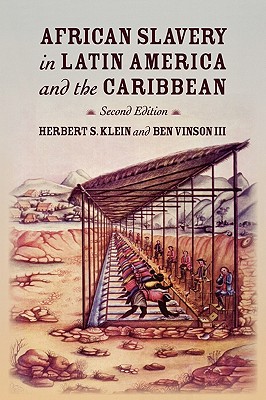

 Oxford University Press, USA
Oxford University Press, USA
African Slavery in Latin America and the Caribbean


Key Metrics
- Herbert S Klein
- Oxford University Press, USA
- Paperback
- 9780195189421
- 9.19 X 6.57 X 0.69 inches
- 0.96 pounds
- History > Latin America - Central America
- English
 Secure Transaction
Secure TransactionBook Description
The first part of the book describes the growth of the plantation and mining economies that absorbed African slave labor, how that labor was used, and how the changing international economic conditions affected the local use and distribution of the slave labor force. Particular emphasis is given to the evolution of the sugar plantation economy, which was the single largest user of African slave labor and which was established in almost all of the Latin American colonies.
Once establishing the economic context in which slave labor was applied, the book shifts focus to the Africans and Afro-Americans themselves as they passed through this slave regime. The first part deals with the demographic history of the slaves, including their experience in the Atlantic slave trade and their expectations of life in the New World. The next part deals with the attempts of the African and American born slaves to create a viable and autonomous culture. This includes their adaptation of European languages, religions, and even kinship systems to their own needs. It also examines systems of cooptation and accommodation to the slave regime, as well as the type and intensity of slave resistances and rebellions.
A separate chapter is devoted to the important and different role of the free colored under slavery in the various colonies. The unique importance of the Brazilian free labor class is stressed, just as is the very unusual mobility experienced by the free colored in the French West Indies.
The final chapter deals with the differing history of total emancipation and how ex-slaves adjusted to free conditions in the post-abolition periods of their respective societies. The patterns of post-emancipation integration are studied along with the questions of the relative success of the ex-slaves in obtaining control over land and escape from the old plantation regimes.
Author Bio
Herbert S. Klein, Gouveneur Morris Professor Emeritus of History, specializes in the social, demographic, and economic history of Latin America. He received his B.A. from the University of Chicago in 1957 and his Ph.D. from Chicago in 1963. He is the author of some 20 books and 165 articles in several languages on Latin America and on comparative themes in social and economic history. Among these books are four comparative studies of slavery, the most recent of which are African Slavery in Latin America and the Caribbean (1986, 2d ed. Co-authored, 2007),
The Atlantic Slave Trade (1999, 2d ed 2010), and Slavery and the Economy of São Paulo, 1750-1850 (co-author) (2003), and Slavery in Brazil (co-author, 2009) as well as four books on Bolivian history, the latest of which is Haciendas and Ayllus: Rural Society in the Bolivian Andes in the 18th and 19th Centuries (1993) and A Concise History of Bolivia (2003, 2d ed 2011).
He has also published on such diverse themes as The American Finances of the Spanish Empire, 1680-1809 (1998), A Population History of the United States (2004) and most recently co-authored, Hispanics in the United States, 1980-2005 (2009). His long-term interests are in comparative economic and social history, and he is currently working on 20th century social change in Latin America and the United States. Aside from courses on Latin America, he gave classes on Quantative Methods in Historical Research and Demographic History.
He has taught full terms as well at the Universities of Toronto, Buenos Aires, La República in Uruguay (two terms in different years), Universidad de San Andrés (Argentina). and Univerisdade de São Paulo (several terms); as well as the Hebrew University of Jerusalem; L'École des Hautes Etudes en Sciences Sociales (Paris) (two terms in different years); Universidade Federal de Minas Gerais, Universidade Federal de Paran, the Colegio de México and at the Universidad Mayor de San Andrés in La Paz, Bolivia. He has been a Guggenheim fellow, a Woodrow Wilson Fellow, a Fulbright Lecturer several times and was a post-doctoral fellow at Yale and Oxford; and since 2003 is editor of the Latin American monograph series of Cambridge University Press.
He was also a Professor of History, and Director of the Center for Latin American Studies at Stanford University for six years , and is currently a Research Fellow and the Latin American Curator at the Hoover Institution at Stanford University, as well as a visiting scholar at the California Center for Population Research, UCLA.
Source:
Videos
No Videos
Community reviews
Write a ReviewNo Community reviews